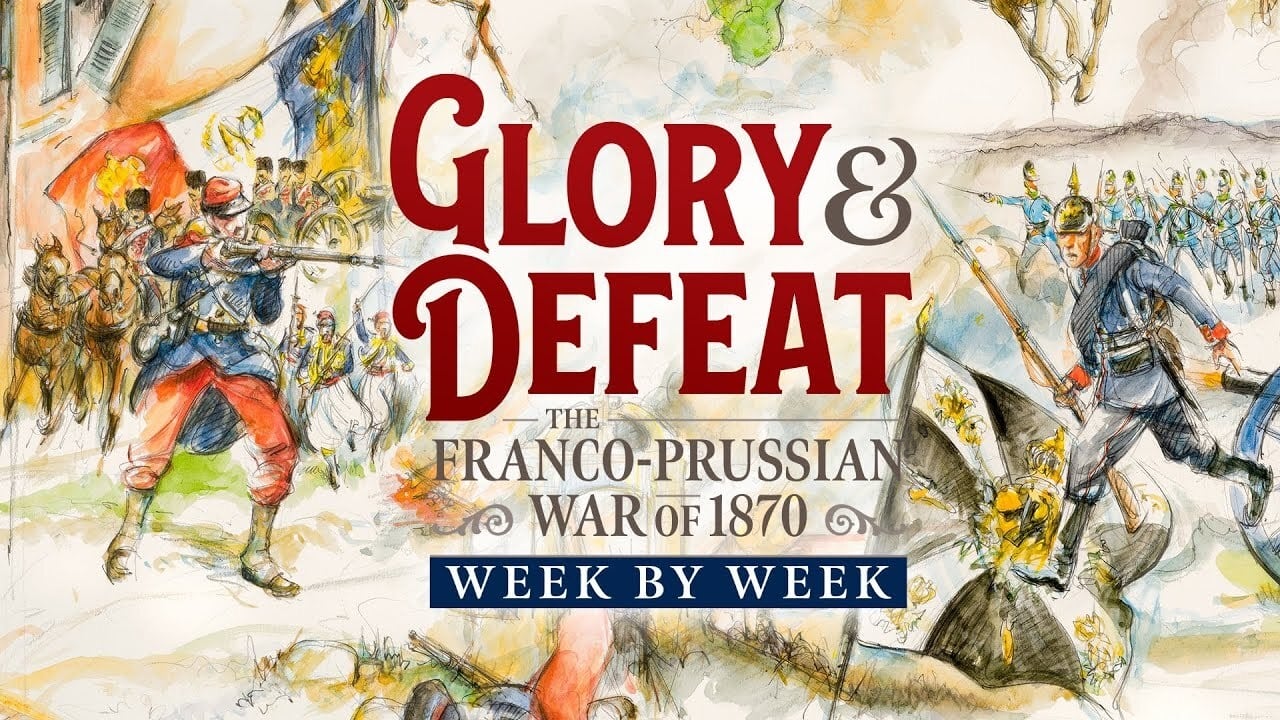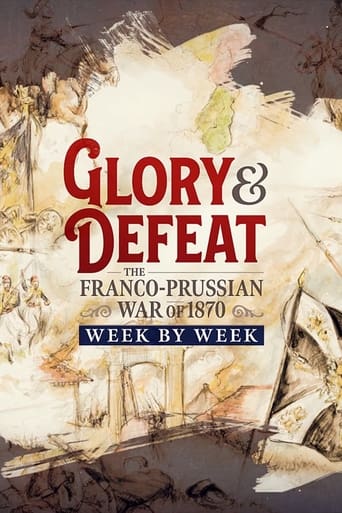Real Time History Season 2022

Realtimehistory creates chronological documentaries such Rhineland 45 and 15 Days in Berlin. They are also know as the team behind the youtube hit series The great War. Now they will cover one of the pivotal wars of the 19th century in real time: the Franco-Prussian War.
Watch NowWith 30 Day Free Trial!
Real Time History
1
Realtimehistory creates chronological documentaries such Rhineland 45 and 15 Days in Berlin. They are also know as the team behind the youtube hit series The great War. Now they will cover one of the pivotal wars of the 19th century in real time: the Franco-Prussian War.
Watch Trailer
Real Time History Season 2022 Full Episode Guide
After Napoleon's defeat in Russia in 1812, the situation on the European continent is rapidly shifting. Prussia and Austria are leaving their unhappy alliance with the French. Prussian general Yorck even pledges his support to the Russian Army which is on the move towards Berlin. In Lützen and Bautzen Napoleon still manages to beat the new coalition, but his losses from Russia put him on the backfoot.
The American invasion of Okinawa was the last big island operation on the Pacific Front. It took the US Marines and Army troops several months to defeat the last Japanese resistance on the island in one of the costliest American victories of the 2nd World War - but in the end not even Japanese Kamikaze attacks and using the civilian population could avert the outcome.
The Battle of the Bulge was one of the last German offensives during the Second World War. It caught the US Army off guard in the Ardennes sector but ultimately the Allies prevailed. But did Unternehmen Wacht am Rhein ('Operation Watch on the Rhine') ever have a chance to succeed and reach Antwerp?
After settling the Schleswig-Holstein question in 1864, Austria and Prussia are uneasy allies. Both are the biggest players in the German confederation. In Bismarck's dream of a united Germany, he sees Prussia as the only leader and wants to force the so called "small German solution" without Austria. And so, in 1866 a war between Austria and Prussia (plus other German states like Bavaria, Baden, Württemberg, Saxony, Hanover) breaks out to settle this question once and for all.
The two Schleswig Wars of 1848-51 and 1864 mark an important period in European History. Intertwined with the 1848 revolutions, the First Schleswig War's settlement tries to uphold the European status quo. But the unhappy belligerents soon find themselves at war again in 1864 when Prussian Prime Minister Otto von Bismarck uses the Second Schleswig War as a first step towards German unification.
Napoleon's retreat from Moscow and from Russia as a whole is one of the most dramatic scenes in history. Starving and freezing, the French Grande Armee is desperately trying to reach the Berezina River. The revitalized Russian Army is on their heels and almost catches their prey in the 2nd Battle of Krasny. But it wasn't just "General Winter" that defeated Napoleon in Russia.
When Napoleon took Moscow, he expected victory over Russia was just a matter of time. But six weeks later he has to flee the city as his entire Russia campaign collapses. The strengthened Russian Army is attacking from three sides, winter is coming and in far away Paris a coup is underway.
After the Battle of Borodino, both sides are badly mauled. Napoleon's Army marches on and reaches Moscow, the old Russian capital. In the Emperor's eyes, capturing the city should win him the war. But while the local Russians set fire to the city, the Tsar in St. Petersburg and the Russian Army command are thinking about turning the tide of the war - and not about accepting a French victory.
The Battle of Borodino was the deadliest single day in history until the outbreak of the First World War. It was the culmination of Napoleon's advance on Moscow. Due to the terrain and the Russian positions, it was a gigantic battle of attrition - which Napoleon won at a high cost.
Napoleon's advancing army had finally spotted the entire Russian Army before them, the stage was set for the deciding clash of the Russian campaign at the small village of Borodino. Before the armies could duke it out, Napoleon wanted to eliminate a forward defensive position on the Russian left flank: The Shevardino Redoubt.
he face of war was changing in 1812. While the Russian Army retreated and left behind scorched earth, Russian partisans took up arms against Napoleon's troops. They harassed and attacked vital supply lines and we a true menace to the Grande Armée's rear.
French general Junot and Emperor Napoleon I had a bit of a history by the time of the 1812 campaign. Even though Junot has been in Napoleon's service for years, he hadn't been promoted to Marshal. At the Battle of Lubino (Battle of Valutino-Gora) Junot stands idly by as the Grande Armee is missing their best chance yet to win a decisive victory over the Russians. To the north, at Polotsk the French and Russians are also clashing.
Smolensk is an important symbolic city to the Russians in 1812, for Napoleon it's a strategic objective he wants to conquer to improve is deteriorating supply situation. The Battle of Smolensk leads to an inferno in the city, it gets virtually destroyed and nearly all residents flee.
The two Russian Western Armies are trying to join up to mount a defense against Napoleon's invasion of Russia. But the speed of the French advance, particularly Marshal Davout and Marshal Murat, are putting pressure on the Russians. And so late July sees a series of battles at Mogilev/Saltanovka and Vitebsk/Ostrovno. Meanwhile the Russian 3rd Observation Army is dangerously close to the border of the Duchy of Warsaw - the Austrians under Schwarzenberg and Reynier's Corps need to stand and fight around Kobryn.
In the beginning of Napoleon's invasion of Russia, the Russian Tsar Alexander I was under pressure to rally his people. A months into the campaign he declared the The Patriotic War (Отечественная война) to fight back Napoleon - who was already having serious supply issues and a deteriorating logistics network.
The Battle of Mir 1812 was the first battle of Napoleon's invasion of Russia. Polish Uhlans ride right into a trap set by Platov's Cossacks and under the Russian summer sun a cavalry skirmish ensues.
When Napoleon marched his Grande Armée into Russia in 1812, he had assembled the biggest army in modern European history. Only half of his troops came from territories of the expanded French Empire. Tens of thousands of troops also came from Poland, Prussia, Austria, and the German States as well as Southern Europe.
When Napoleon's Grande Armee crossed the Nemen river into the Russian Empire in 1812, the die had been cast. In the years between the peace of Tilsit and the war against Russia, Tsar Alexander I and Emperor Napoleon had praised each other and Russia had even joined the continental blockade of Napoleon's arch enemy Great Britain. Still, in 1811 both sides saw war as inevitable.
The Siege of Paris and the end of the Franco-Prussian War had brought social unrest in Paris (and other French cities) to a boiling point. Radical citizens take up arms and proclaim La Commune, a self-organized alternative to the French Republic. But soon the French Army is cracking down and Paris experiences a Week of Blood.
The end of the Franco-Prussian War is marked by humiliation for France. German soldiers march into Paris and the French Army of the East under Bourbaki flees to neutral Switzerland to surrender there.
The proclamation of the German Empire on 18 January 1871 is usually portraited as a glorious ceremony. Most people associated it with the famous paintings from Anton von Werner. But the ceremony itself was far from well organized and the soon-to-be Emperor Wilhlem I himself was not to thrilled about the whole affair.
In minus 20 degrees the rag tag French Armee L'Est still tries to relieve Belfort - which is under siege by the Baden Corps under General von Werder. Belforts resistance against the siege is later immortalized in the Lion of Belfort.
One of the last bastions of French resistance in the new year 1871 is Belfort. A ragtag army called "Army of the East" rushes to free the city near the Swiss border. Meanwhile the Germans prepare to announce their Empire in Versailles.
Free Trial Channels
Seasons





























